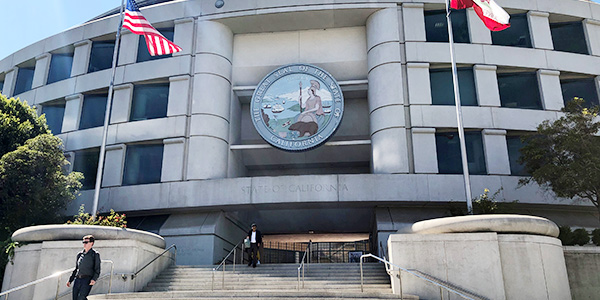An ugly feud between the members of the California Public Utilities Commission and its executive director, Alice Stebbins, played out in public Monday during an online hearing in which the commissioners unanimously voted to fire her.
“A vote was taken to dismiss the executive director … effective Sept. 4,” CPUC President Marybel Batjer said after the commissioners deliberated in closed session for more than three hours. She did not elaborate and quickly ended the video call.
Both sides hurled accusations Monday morning during arguments Stebbins had requested remain public, an unusual move in a personnel matter.
Batjer outlined the results of a state investigation that found Stebbins hired poorly qualified former colleagues for key positions, including a deputy executive director. The CPUC president said Stebbins’ behavior had been “abhorrent” after the accusations came out, as she immediately went to the media and leveled her own accusations of wrongdoing at the commission.
Stebbins argued she was being targeted as a whistleblower because she reported the CPUC had failed to collect $200 million in fees from regulated utilities.
“I and my staff blew the whistle on that, and that’s why I’m being fired,” Stebbins said.
Her lawyer told the commissioners they had violated the state’s open meeting laws by texting about Stebbins’ case and deciding her fate well in advance of Monday’s hearing.
‘Appalling and Disgraceful’
The case began in July when the State Personnel Board (SPB) issued a report to the CPUC concluding Stebbins had improperly hired former colleagues who lacked job qualifications. The report was made public Aug. 6.
In particular, the SPB said Stebbins had “preselected” Bernard Azevedo, her longtime coworker at the state Air Resources Control Board and Water Resources Control Board, as the deputy executive director of the CPUC’s Administrative Services Division, which manages facilities, budgets and contracts.
“‘Preselected’ means you had already made up your mind to hire this person before the recruitment process occurred,” Batjer said. State law requires civil servants to be hired based on merit, she noted.
Azevedo was less qualified than other applicants, the report said. He had no college degree, and his experience was limited to accounting. The job description called for someone with significant experience in administration and budgeting who could represent the CPUC before the State Legislature.
Other candidates had post-graduate degrees and had managed fiscal affairs at executive levels, it said. CPUC employees who rated the candidates said they felt pressured to hire Azevedo because Stebbins made it clear whom she preferred, it said.
Four months after Azevedo was hired, Stebbins added new duties to his role and increased his six-figure salary by 49%. She then took away some of the duties, “thereby removing the justification for the higher salary,” Batjer said, citing the report. Asked about the situation, Stebbins falsely claimed Azevedo was still performing the duties, Batjer said.
“It is appalling and disgraceful to engineer the hiring of a marginally qualified former colleague over more qualified candidates, to spike the person’s pay and then make false statements to justify the compensation,” Batjer said.
Other CPUC appointments and transactions under Stebbins were of “highly questionable legitimacy,” the SPB found.
After the board’s report was sent to the CPUC, the commission undertook its own investigation. Stebbins was removed from her usual personnel duties but continued to make hiring decisions against clear orders, Batjer said.
She criticized Stebbins for failing to show concern for her employees or to take responsibility.
“Instead, you repeatedly suggested that the commissioners should use our political influence to, in your words, ‘make the SPB report go away,’” Batjer said. “Your suggestion was abhorrent.”
Stebbins’ claim that the CPUC was owed $200 million is false, Batjer said. The commission had $50 million in uncollected fees at the end of 2019, including a $20 million fine of a bankrupt, defunct telecommunications company, she said. It had repeatedly tried to collect that fine, including by going to court, she said.
‘A Chilling Message’
Stebbins was given 45 minutes to make her argument. Her attorney Karl Olson began by telling the commissioners that the “firing of Ms. Stebbins would be a clear case of retaliation against a whistleblower.”
On May 15, Azevedo filed a detailed report about the $200 million in uncollected revenue, Olson said. It showed the CPUC collected only $21 million in fiscal year 2018-19 and, as of June 30, 2019, was owed $200 million, he said.
“This contradicts what the commission … said today about how the $200 million was an exaggeration,” he said.
Olson also said the commissioners had repeatedly spoken in text messages about firing Stebbins, reaching a consensus long before Monday’s hearing.
“You all agreed in serial private meetings to fire Ms. Stebbins,” the lawyer said. One commissioner texted, “I can’t imagine her remaining,” according to Olson. Another texted, “It’s not tenable for her to stay,” he said.
“Wrong. What’s not tenable is to violate the state constitution,” which requires open meetings, he said. “You made the decision in secret texting sessions.
“You probably know the law, and you consciously and brazenly defied it,” Olson added.
Two commissioners spoke with Stebbins by telephone the night of Aug. 3 and told her they had decided to fire her, he said. He contended Stebbins should have been given a second chance.
“There was and is no reason to fire Ms. Stebbins, because the SPB report was contrived and unfounded and did not detract from the fact that she had done an excellent job,” he said. “She hired 800 people and was moving the PUC in the right direction. The SPB raised unfounded questions about five people who were doing an excellent job including Mr. Azevedo.
“If you go ahead with this firing, this kangaroo court, in which President Batjer seems to be serving as prosecutor, judge and jury, you will send a chilling message to whistleblowers in state service: People who report illegal and improper activity will be fired,” Olson said.






